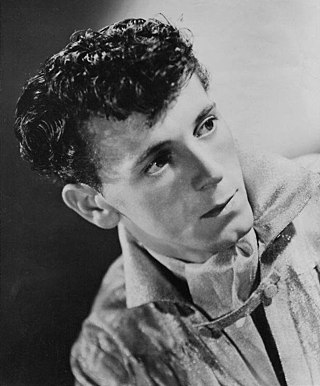
Vincent Eugene Craddock, known as Gene Vincent, was an American rock and roll musician who pioneered the style of rockabilly. His 1956 top ten hit with his backing band the Blue Caps, "Be-Bop-a-Lula", is considered a significant early example of rockabilly. His chart career was brief, especially in his home country of the US, where he notched three top 40 hits in 1956 and 1957, and never charted in the top 100 again. In the UK, he was a somewhat bigger star, racking up eight top 40 hits from 1956 to 1961.

Arthur Alexander was an American country-soul songwriter and singer. Jason Ankeny, music critic for AllMusic, said Alexander was a "country-soul pioneer" and that, though largely unknown, "his music is the stuff of genius, a poignant and deeply intimate body of work on par with the best of his contemporaries." Alexander's songs were covered by such stars as the Beatles, the Rolling Stones, Bob Dylan, Gerry and the Pacemakers, Otis Redding, Tina Turner, Pearl Jam, and Jerry Lee Lewis.

Connie Smith is an American country music singer and songwriter. Her contralto vocals have been described by music writers as significant and influential to the women of country music. A similarity has been noted between her vocal style and the stylings of country vocalist Patsy Cline. Other performers have cited Smith as influence on their own singing styles, which has been reflected in quotes and interviews over the years.

Wanda LaVonne Jackson is an American singer and songwriter. Since the 1950s, she has recorded and released music in the genres of rock, country and gospel. She was among the first women to have a career in rock and roll, recording a series of 1950s singles that helped give her the nickname "The Queen of Rockabilly". She is also counted among the first female stars in the genre of country music.
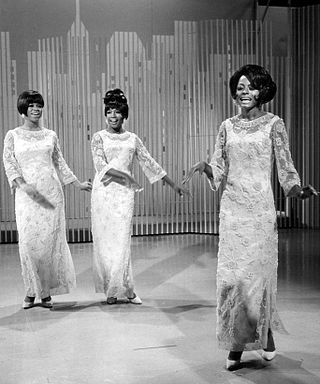
American girl group The Supremes have released 29 studio albums, four live albums, two soundtrack albums, 32 compilation albums, four box sets, 66 singles and three promotional singles. The Supremes are the most successful American group of all time, and the 26th greatest artist of all time on the US Billboard charts; with 12 number-one songs on the Billboard Hot 100 and three number-one albums on the Billboard 200. The Supremes were the first artist to accumulate five consecutive number-one singles on the US Hot 100 and the first female group to top the Billboard 200 albums chart with The Supremes A' Go-Go (1966). In 2017, Billboard ranked The Supremes as the number-one girl group of all time, publishing, 'although there have been many girl group smashes in the decades since the Supremes ruled the Billboard charts, no collective has yet to challenge their, for lack of a better word, supremacy.' In 2019, the UK Official Charts Company placed 7 Supremes songs—"You Can't Hurry Love" (16), "Baby Love" (23), "Stop! In the Name of Love" (56), "Where Did Our Love Go?" (59), "You Keep Me Hangin' On" (78), "Come See About Me" (94) and "Stoned Love" (99)—on The Official Top 100 Motown songs of the Millennium chart, which ranks Motown releases by their all-time UK downloads and streams.
"Dream Lover" is a song written by American musician Bobby Darin. Darin recorded his composition on March 5, 1959 and released it as a single the following month. It was produced by Ahmet Ertegun and Jerry Wexler and engineered by Tom Dowd.
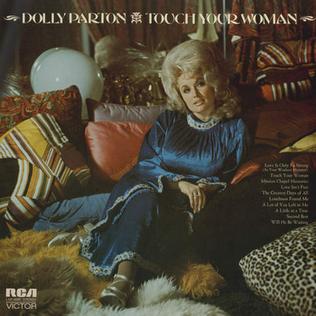
Touch Your Woman is the ninth solo studio album by American singer-songwriter Dolly Parton. It was released on March 6, 1972, by RCA Victor. The album's title song and single, "Touch Your Woman", was nominated for a Grammy.

Hello, I'm Dolly is the debut studio album by American singer-songwriter Dolly Parton. It was released on September 18, 1967, by Monument Records. The album was produced by Fred Foster. It peaked at number 11 on the Billboard Top Country Albums chart. The album spawned two top 40 hits, "Dumb Blonde" and "Something Fishy", which peaked at numbers 24 and 17, respectively.

Billy Wayne "Crash" Craddock is an American country and rockabilly singer. He first gained popularity in Australia in the 1950s with a string of rockabilly hits, including the Australian number one hits "Boom Boom Baby" and "One Last Kiss" in 1960 and 1961 respectively. Switching to country music, he gained popularity in the United States in the 1970s with a string of top ten country hits, several of which were number one hits, including "Rub It In", "Broken Down in Tiny Pieces", and "Ruby Baby". Craddock is known to his fans as "The King Of Country Rock Music" and "Mr. Country Rock" for his uptempo rock-influenced style of country music.

Myrna Joy "Jody" Miller was an American singer, who had commercial success in the genres of country, folk and pop. She was the second female artist to win a country music accolade from the Grammy Awards, which came off the success of her 1965 song "Queen of the House". By blending multiple genres together, Miller's music was considered influential for other music artists.

"She's Got You" is a country song written by Hank Cochran and first recorded and released as a single by Patsy Cline. Musically the song is an upbeat jazz-pop song with country overtones to support it.
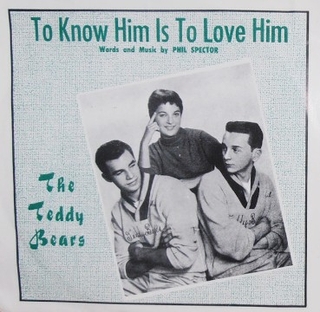
"To Know Him Is to Love Him" is a song written by Phil Spector, inspired by words on his father's tombstone, "To Know Him Was to Love Him." It was first recorded by the only vocal group of which he was a member, the Teddy Bears. Their recording spent three weeks at No. 1 on the Billboard Hot 100 chart in 1958, while reaching No. 2 on the UK's New Musical Express chart. Peter & Gordon and Bobby Vinton later had hits with the song, with its title and lyrics changed to "To Know You Is to Love You". In 1987, the song was resurrected by Dolly Parton, Linda Ronstadt, and Emmylou Harris, whose Trio recording topped the U.S. country singles chart.

One's on the Way is the nineteenth solo studio album by American country music singer-songwriter Loretta Lynn. It was released on March 6, 1972, by Decca Records.
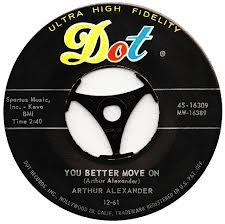
"You Better Move On" is a 1961 rhythm and blues song by Arthur Alexander. It reached number 24 on the Billboard Hot 100 in March 1962. Versions by Billy "Crash" Craddock, George Jones and Johnny Paycheck were hits on the Country charts.
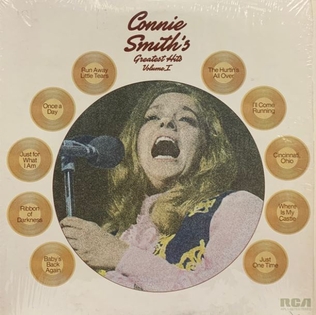
Connie Smith's Greatest Hits, Vol. I is a compilation album by American country singer Connie Smith, released in October 1973 by RCA Victor. The album was one of several compilations released following Smith's departure from RCA Victor. It included ten of Smith's most popular singles from her career, such as the number one single, "Once a Day", and top ten single, "The Hurtin's All Over". The album charted on the American country LP's chart in 1973 and received a positive review from Billboard magazine.

I Got a Lot of Hurtin' Done Today / I've Got My Baby on My Mind is the twenty-fourth solo studio album by American country singer Connie Smith. It was released in January 1975 and contained 11 tracks. It was also considered to be one of her "most commercially-successful" discs of the decade, according to biographer Barry Mazor. Three singles were included on the project. Both "I've Got My Baby on My Mind" and her cover of "Why Don't You Love Me" reached the top 15 of the American country songs chart. "I Got a Lot of Hurtin' Done Today" would chart in the top 30. The album itself reached the American country LP's chart in early 1975. Billboard gave the album a positive review following its release.
"Missing You" is a song written by Red Sovine and Dale Noe, which was originally released by Red Sovine in 1955, and was later a hit single for Webb Pierce in 1957, Ray Peterson in 1961, and was posthumously a hit for Jim Reeves in 1972. Sovine's version was the B-side of Red Sovine and Webb Pierce's hit single "Why Baby Why".

The Mayor of McLellan, Florida is a studio album by American country music singer–songwriter Hank Locklin. It was released in November 1972 via RCA Victor Records. Consisting of ten tracks, the album was co-produced by Chet Atkins, Jerry Bradley, Danny Davis and Ronny Light. It was Locklin's final studio release for the RCA Victor label and contained among his final single releases.

A Woman Lives for Love is a studio album by American recording artist Wanda Jackson. It was released in August 1970 via Capitol Records and contained ten tracks. It was the sixteenth studio album released in Jackson's career and the first to be solely-produced by George Richey. The album's title track, became a top 20 charting single on the American country chart prior to the album's original release. A Woman Lives for Love received a positive review from Billboard magazine in 1970.

I Wouldn't Want You Any Other Way is a studio album by American recording artist, Wanda Jackson. It was released in September 1972 by Capitol Records and contained ten tracks of country music. The album was Jackson's 19th release in her career. Four singles were spawned from the album including the title track.


















